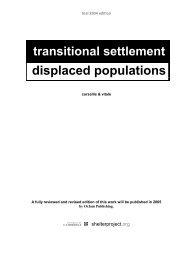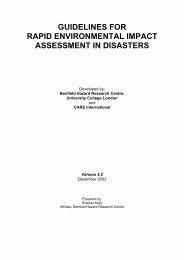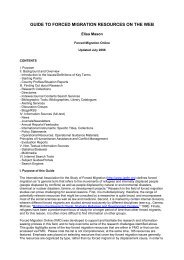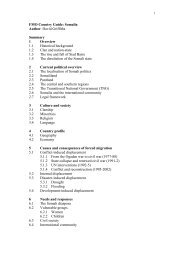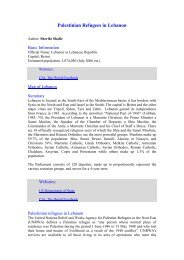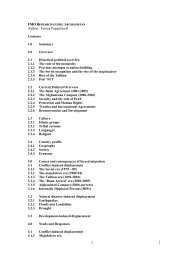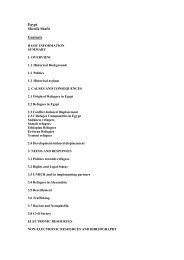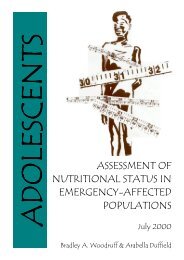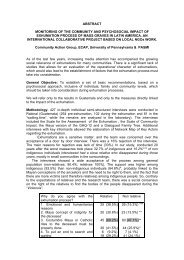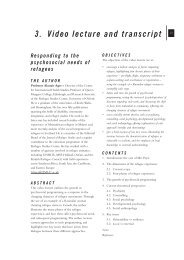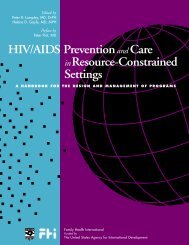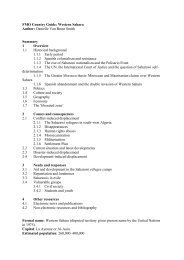FMO Country Guide: Ethiopia - Forced Migration Online
FMO Country Guide: Ethiopia - Forced Migration Online
FMO Country Guide: Ethiopia - Forced Migration Online
Create successful ePaper yourself
Turn your PDF publications into a flip-book with our unique Google optimized e-Paper software.
Inherently, the types of job opportunities offered in the Middle East—predominately<br />
domestic helpers and sex workers—also reinforces the gender bias.<br />
Trafficking as defined by the UN protocol is: ‘The recruitment, transportation, transfer,<br />
harboring or receipt of persons, by the threat or use of force, by abduction, fraud,<br />
deception, coercion or the abuse of power or by the giving or receiving of payments or<br />
benefits to achieve the consent of a person having control over another person for the<br />
purpose of exploitation’ (UNCJIN 2000). In the case of <strong>Ethiopia</strong>, trafficking mostly takes<br />
the form of transporting migrants by fraud, deception and different forms of coercion. In<br />
this regard, many young girls have become victims of trafficking by illegal agents who<br />
claim to have established contacts with employers. According to the International<br />
Organization for <strong>Migration</strong> (IOM), 72 per cent of the <strong>Ethiopia</strong>n surveyed migrants used<br />
the services of both illegal and legal employment agents for the process of migration. Of<br />
these, 60 per cent used illegal agents, 20 per cent used legal agents, and 20 per cent did<br />
not know the status of the agents they used (Messele 2003).<br />
Women’s vulnerability has not been limited to trafficking alone but also to violence and<br />
violation of their rights upon arrival in the country of destination. It has now become<br />
common practice for women migrants to be asked or forced to perform other duties<br />
outside of the contract, such as prostitution. Lured by their desire to send remittances to<br />
their families and the empty promises of their traffickers, many young migrants now face<br />
various forms of persecution in the hands of their ‘owners’. Having given up their<br />
freedom of movement, they have become vulnerable to physical as well as mental torture.<br />
It is reported that many sponsors keep employees’ travel documents as a means of<br />
guaranteeing continued service (Rifkallal 2003).<br />
Weakness in the <strong>Ethiopia</strong>n legal structure has further exposed women to exploitation.<br />
The <strong>Ethiopia</strong>n Penal Code defines trafficking in ‘women, infants and young persons’<br />
narrowly without considering other forms of trafficking. According to Article 605 of the<br />
Penal Code, the term trafficker refers to a person who transports women, infants and<br />
young people out of the country illegally by enticing them or otherwise inducing them to<br />
engage in prostitution. Labor trafficking, which does not fall under the ‘prostitution’<br />
category, is thus not given due attention and cannot be used to bring illegal traffickers of<br />
labor to justice. However, new policies are being formulated and the government of<br />
<strong>Ethiopia</strong> is now engaging in various endeavors to protect the rights of its citizens in the<br />
Diaspora. In this regard, the Private Employment Agency Proclamation No. 104/1998<br />
(Hagos 2003) was a step forward. On the basis of this proclamation, <strong>Ethiopia</strong>ns can only<br />
migrate in search of employment opportunities through legal employment agencies or by<br />
direct employment contracts with employers (Hagos 2003). The <strong>Ethiopia</strong>n government<br />
through the Ministry of Foreign Affairs also created the General Directorate in charge of<br />
<strong>Ethiopia</strong>n Expatriates Affairs in January 2002. Through this body, <strong>Ethiopia</strong>n migrants are<br />
encouraged to return, participate in national affairs, mobilize the <strong>Ethiopia</strong>n community<br />
abroad, conduct researches, etc. However, there is more work that needs to be done to<br />
ensure the protection of the rights of migrants.<br />
21



